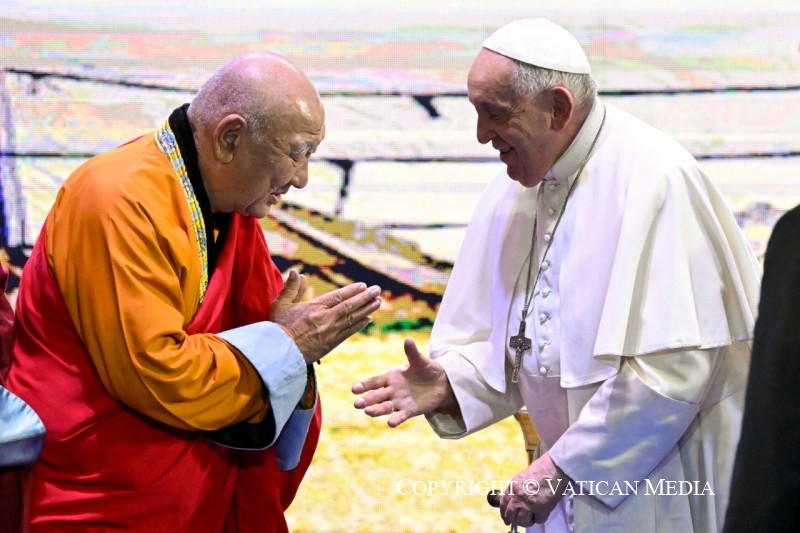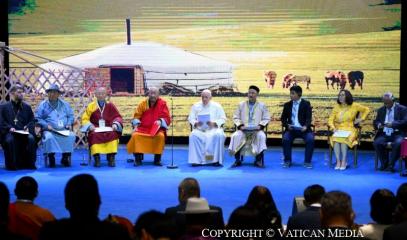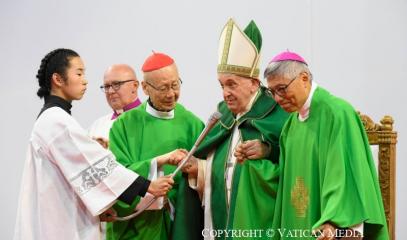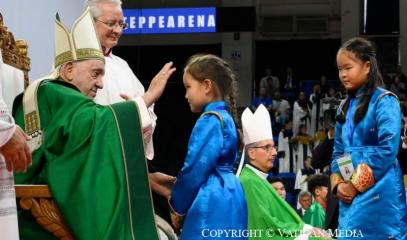Pope: Asia’s harmony is wisdom in today's world
At the interfaith meeting in Ulaanbaatar, Francis stressed sharing differences for the good of all. “There can be no mixing, then, of religious beliefs and violence, of holiness and oppression, of religious traditions and sectarianism.” In his address, he also quoted from Buddha and Gandhi. “And to Chinese Catholics: I ask you to be good Christians and good citizens.” Inspired by Fr Pierre Teilhard de Chardin, he mentioned the desert of Ordos, home to ethnic Mongolians in the People's Republic of China.
Ulaanbaatar (AsiaNews) – The harmony taught by all the great religions of Asia is a "great patrimony of wisdom" in today's world. This is the kernel of Pope Francis’s Sunday message in Ulaanbaatar, key day in his apostolic journey to Mongolia, whose message can cross borders that are still politically shut, like the one with the People's Republic of China.
The pontiff’s day began with the long-awaited ecumenical and interfaith meeting at the Hun Theatre. In the predominantly Buddhist country, 11 religious leaders joined the Holy Father on stage.
In his address, Francis mentioned “Karakorum, the ancient imperial capital, which admirably housed within its walls places of worship belonging to different creeds, thus exemplifying a commendable harmony.”
For the pope, such harmony comes with “typically Asian accents. Harmony is that special relationship born of the creative interplay of differing realities, without imposition or amalgamation, but with complete respect for their differences, in view of a serene life in common. I ask myself: Who, more than believers, is called to work for harmony among all?”
The “social significance of our religious traditions can be gauged by the extent to which we are capable of living in harmony with other pilgrims on this earth and can foster that harmony in the places where we live.”
The “wise man rejoices in giving, and by that alone does he become happy,” the pope said, quoting from the Dhammapada, the collection of sayings of the Buddha. Similarly, citing his namesake, Francis of Assisi, he said, “Where there is hatred, let me bring love, where there is offence, let me bring pardon, where there is discord, let me bring union.”
Contrasting the altruism of harmony to “narrowness, unilateral imposition, fundamentalism and ideological constraint,” the pope warns the latter can “destroy fraternity, fuel tensions and compromise peace, the beauty of life is born of harmony, which is inherently communitarian: it flourishes through kindness, listening and humility.”
To grasp this, one needs a pure heart because, “true beauty, as Gandhi said, lies in purity of the heart.” Indeed, such harmony is the gift that religions must offer today to a world that appears to be concerned “with the earthly, horizontal dimension of humanity,” and thus “risks forgetting heaven, for which we were made.”
For Francis, “humanity [is] so often led astray on its journey by the myopic pursuit of profit and material comfort. People in our time are often unable to find the right path: concerned only with earthly interests, humanity ends up destroying the earth and mistaking progress for regress, as attested by so many injustices, conflicts, persecutions, environmental disasters and great disregard for human life.”
The pontiff went on to urge the world to draw from the "great patrimony of wisdom" that Asia has in its religions, outlining this in 10 points. The latter are: “a healthy relationship to tradition, despite the temptations of consumerism; respect for your elders and ancestors – today how greatly do we need a generational covenant between old and the young, a dialogue between grandparents and grandchildren! Also, care for the environment, our common home, another great and pressing need, for we are in peril. Then too, the value of silence and the interior life, as a spiritual antidote to so many ills in today’s world. Also, a healthy sense of frugality; the value of hospitality; the ability to resist attachment to material objects; the solidarity born of a culture of interpersonal bonds; and respect for simplicity. Finally, a certain existential pragmatism that tenaciously pursues the good of individuals and of the community.”
Highlighting again the image of the ger, the Mongolian tent, the great metaphor of this journey, Francis stressed its role as a place of welcome and refreshment for all, illuminated by the light that enters from above.
“The reconciled and prosperous humanity that we, as followers of different religions, seek to promote is thus symbolized by this harmony, togetherness and openness to the transcendent. And this, in turn, inspires a commitment to justice and peace, grounded in our relationship to the divine.”
But such a symbol requires responsibility. In fact, “we are called to testify to the teachings we profess by the way we act; we must not contradict them and thus become a cause of scandal. There can be no mixing, then, of religious beliefs and violence, of holiness and oppression, of religious traditions and sectarianism.”
Turning to the suffering endured in the past by Mongolians, especially Buddhist communities, with tens of thousands of deaths in religious persecution by the communist regime, Francis said that he hoped this memory might “bestow the strength needed to transform dark wounds into sources of light, senseless violence into wisdom of life, devastating evil into constructive goodness.”
He stressed that in pluralistic societies every religious institution “has the duty, and above all the right, to freely express what it is and what it believes, in a way respectful of the conscience of others and in view of the greater good of all.”
This is precisely what the Catholic Church wants. Today, she “offers the treasure she has received to every person and culture, in a spirit of openness and in respectful consideration of what the other religious traditions have to offer.”
For “Dialogue, in fact, is not antithetical to proclamation: it does not gloss over differences, but helps us to understand them, to preserve them in their distinctiveness and to discuss them openly for the sake of mutual enrichment.”
We have, the pope said, a “common humanity, blessed by heaven, the key to our journey on this earth. Brothers and sisters, we share a common origin that confers equal dignity on everyone, and have a shared path that we can only travel alongside one another, as we dwell under the one sky that surrounds and illumines us.”
Later in the afternoon, the pontiff pointed to the same path during the moment most awaited by the local Catholic community and the hundreds of faithful who came from other Asian countries, namely the Mass celebrated at the Steppe Arena, Ulaanbaatar’s ice hockey venue.
The journey undertaken by participants in the physical space of Mongolia as in the heart of each one must cope with the heat of the desert, mentioned by the psalmist in today's liturgy.
“Deep within us, we have an insatiable thirst for happiness, we seek meaning and direction in our lives, a reason for all that we do each day.”
“God cares for us and offers us clear, refreshing water, the living water of the Spirit”. His word “always brings us back to what is essential, to the very heart of our faith: allowing ourselves to be loved by God and in turn to make our lives an offering of love.”
Only this will allow Peter to understand the way of the cross and the message that today his successor repeats to the small flock of Mongolia: “You need not be famous, rich or powerful to be happy. No! Only love satisfies our hearts’ thirst, only love heals our wounds, only love brings us true joy.”
At the end of the Mass, Francis turned his gaze from Mongolia to the whole of Asia, greeting the groups who had arrived “from various regions of the immense continent of Asia, in which I am honoured to find myself. I embrace all of you with great affection. I am especially grateful to all those who assisted the local Church with their spiritual and material support.”
Taking the hands of Cardinal John Tong and Bishop Stephen Chow of Hong Kong (who will become a cardinal on 30 September), the pontiff addressed his greetings to the people of China.
“I would like to take this opportunity [. . .] to send a heartfelt greeting to the noble Chinese people,” he said. “I send my good wishes to them all: always move forward, always advance! And to Chinese Catholics: I ask you to be good Christians and good citizens.”
And in an indirect but significant way, he added a thought for the other half of the Mongolian people, those who live within the borders of China in the Inner Mongolia Autonomous Region whose bishops were not allowed by Beijing to travel to Ulaanbaatar.
He did so by quoting from a prayer by the Jesuit Pierre Teilhard de Chardin, composed a hundred years ago in the desert of Ordos, "not far from here", across the border in today’s People's Republic of China.
In that setting, Father Pierre Teilhard, “This priest, often misunderstood”, was unable to celebrate the Eucharist. Instead, he composed the “Mass on the World”, which includes the following words: “Receive, O Lord, this all-embracing host, which your whole creation, moved by your magnetism, offers you at the dawn of this new day”.
Such hope was heard again today in Mongolia, with eyes looking over the still impossible border.










.png)










